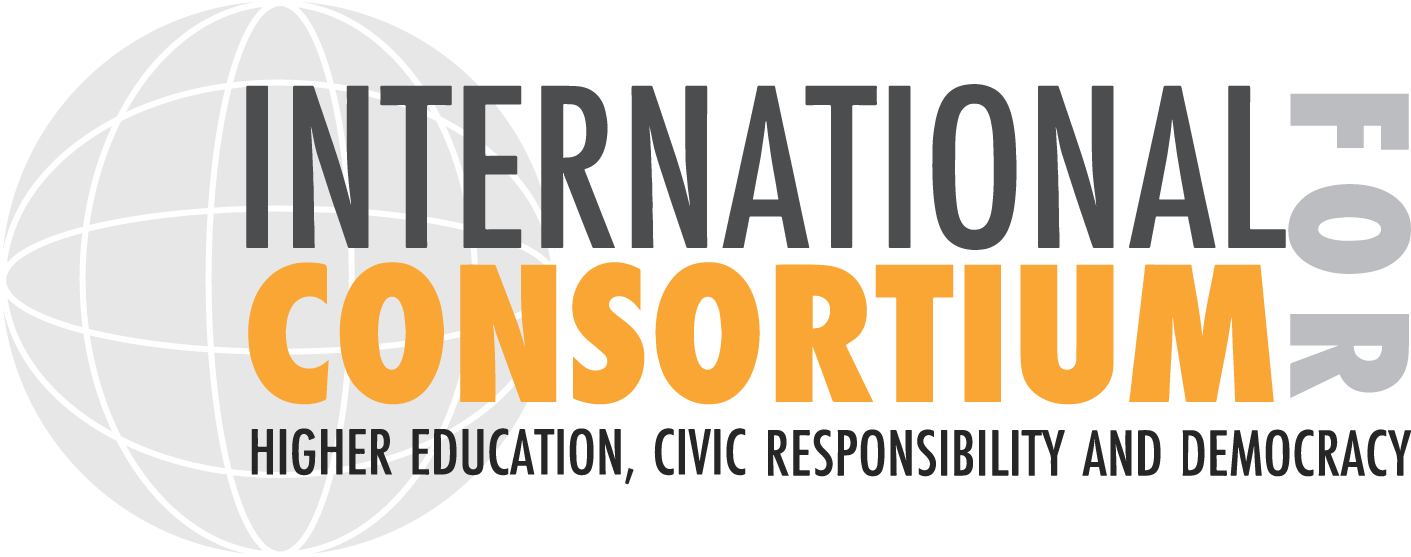
About
The International Consortium for Higher Education, Civic Responsibility, and Democracy
A Global Research Network to Support Development of Democratic Societies Through Education Mission and Structure
MISSION
The International Consortium for Higher Education, Civic Responsibility, and Democracy (IC) was created in 1999 to work with the Council of Europe (CoE) with the objective of developing, explaining, and advancing the contributions of higher education to democracy on college and university campuses, their local communities, and the wider society. It is composed of the United States (represented by a Steering Committee from the American Association of Colleges and Universities, American Association of State Colleges and Universities, American Council on Education, Anchors Institutions Task Force, Campus Compact, Democracy Commitment, and NASPA-Student Affairs Professionals in Higher Education), Australia (Engagement Australia), the United Kingdom (represented by the National Co-ordinating Centre for Public Engagement), Ireland (Campus Engage Ireland), and South Africa (represented by Universities South Africa), as well as the Magna Charta Observatory. The Organization of American States (OAS)* joined the cooperation between the IC and COE in April 2018.* The International Association of Universities (IAU)* joined the cooperation in October 2019.
In January 2021, CoE, IC, OAS, and IAU formally named their partnership the Global Cooperation for the Democratic Mission of Higher Education.
The Barbara and Edward Netter Center for Community Partnerships at the University of Pennsylvania houses the executive offices of the International Consortium. Ira Harkavy, Associate Vice President and Founding Director of the Netter Center, is the Chair.
For more information on the Global Cooperation, see Chapter 1 of Higher Education’s Response to the COVID-19 Pandemic: Building a More Sustainable and Democratic Future (Council of Europe Higher Education Series No. 25, 2021).
Global Cooperation and International Consortium steering committee members can be found here.
FOUNDATIONAL DOCUMENTS
- Budapest Declaration for a Greater Europe Without Dividing Lines
- Wingspread Declaration on Renewing the Civic Mission of the American Research University
- Presidents’ Fourth of July Declaration on the Civic Responsibility of Higher Education
- Australian Consortium on Higher Education, Community Engagement and Social Responsibility Foundation Paper (PDF)
- History and Future of the International Consortium for Higher Education, Civic Responsibility, and Democracy (PDF)
MEMBERSHIP
Membership in the International Consortium for Higher Education, Civic Responsibility and Democracy is granted by country. Higher Education Institutions must have a representative body sponsor their membership. In the International Consortium’s initial phase, each country was required to complete the pilot study on “Universities as Sites of Citizenship and Civic Responsibility.” Please contact us for more information on joining the International Consortium.
* The Council of Europe, established in 1949, promotes human rights, democracy and the rule of law, develops continent-wide agreements to standardize member countries’ social and legal practices, and promotes awareness of a European identity across cultures based on shared values. It comprises 46 member countries. The Steering Committee for Education oversees the Council of Europe’s programs in the field of education and advises the Committee of Ministers on education issues. Governments of the Council of Europe member States are represented in the Committee by senior officials from the general education and higher education sectors.
* The Organization of American States, established in 1948, is the main political forum of the Western Hemisphere. It gathers all 35 independent states of the Americas to jointly promote and consolidate democracy; strengthen human rights; foster peace, security, and cooperation; and advance in achieving common interests. Since its inception, the main objective of the OAS has been to prevent conflicts and support political stability, social inclusion, and prosperity in the region through dialogue and collective actions including cooperation and mediation.
* The International Association of Universities, created under the auspices of UNESCO in 1950, represents universities and other higher education institutions, organisations and affiliates across 130 countries. The IAU acts as the global voice of higher education and its organisations, in particular to UNESCO, advocating and advancing a dynamic leadership role for higher education in society. Articulating the fundamental values and principles that underpin education and the pursuit, dissemination and application of knowledge, the Association advocates the development of higher education policies and practices that respect diverse perspectives. In addition, it promotes social responsibility and contributes to the development of a sustainable future.